

|
Back to |
| The Front Page |
| People |
|
His breakthrough year: A courtside chat with Ben Rothman |
||||||||||||||||
|
by Bob Alman, Founding Editor Posted December 8, 2008
|
||||||||||||||||
|
||||||||||||||||
This interview was completed at the end of the USCA Selection Eights in early November, 2008, at the National Croquet Center in West Palm Beach, Florida. Most of the highest-ranked players in America were competitors, and Ben, at the age of 24, was the youngest and greenest player in the top eight Ė the most likely to be considered for future America teams. Rothman began to impress in 2007, but the record shows that 2008 is the year of his breakthrough as a serious competitor - the first year in which he and others have expected him to finish in the top tier of any competition. He is currently ranked #3 in America and #47 in the world. His breakthrough year has brought him within range of a major life goal: Achieving his full potential as a player and establishing himself as a full-time croquet pro.
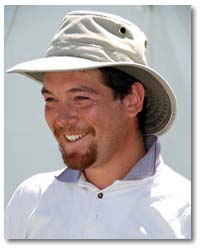
|
BEN ROTHMAN: The first tournaments I played in were nine-wicket tournaments, and when I started doing well in the nine-wicket tournament in Maine, at Claremont, their once-a-year Croquet Classic....
BOB: Uncle Larryís tournament.
BEN: Yes, Larry Stettner. When I started doing well in that tournament, I started getting serious about playing, and then I learned six-wicket, which improved all my skills.
BOB: And when was that?
BEN: That was 1999, when I first won in Maine. I thought, then, that I could become a really good player.
| BEN HUNTER ROTHMANíS FIRSTS |
|
Born November 9, 1983, Berkeley, California.
|
BEN: Yes, I started playing in Stern Grove San Francisco in í97 or maybe í98.
BOB: And people considered you a promising player then, as I recall.
BEN: Yes, I had a lot of fun playing in the San Francisco Open, and then in the last SF Open, in 2000, I played in the First Flight for the first time against Ryan Stern, a medical student in the SFCC. I remember Marc Batten and Reuben Edwards Ė your ďweb babiesĒ - as being the next level that I would try to get to. They definitely outclassed me in their development at the time.
BOB: So you reached that point of self-realization when you won Claremont when you were 16 years old. Did you begin to play a lot more croquet then, more serious croquet? Because you were still in high school....
BEN: I still could play only in the summers, and I would come out and play in Oakland or San Francisco every once in a blue moon, and after that I was introduced to Association Croquet by Reuben and Martyn Selman and Mike Orgill, And I decided that the Association game would be the means by which I might become a really good player. So I started with the North American Open that Mike Orgill was organizing at Sonoma at the time.
BOB: Letís talk about some kind of balance between the fun of croquet and the work you need to do to become really good, really tops. Can you do both? How are they related? Does the drive to win interfere with the fun? Or does it enhance the fun?
BEN: Croquet was always fun. And I do find that in preparing for a tournament, there are two kinds of preparation: Fun preparation and Serious preparation. Youíre refining tactics, to stay focused, youíre preparing breaks, but youíre not going out there and just running breaks around the court...
BOB: Which is boring.
BEN: Yes, I donít want to run a 15-minute break, it gets boring, and with nothing at stake, I lose focus. So what I try to do is come up with different drills to keep it interesting, to keep the focus in. But itís not going to be fun all the time, when youíre seriously preparing to play your best....
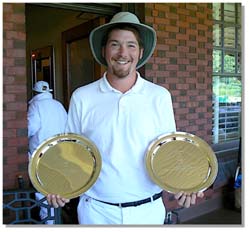
|
| A big double-win for Ben in 2007 was the Merion Invitational in Pennsylvania, where he took singles in B Block and won Championship Doubles. |
BOB: Okay, on the subject of ďfun,Ē please donít give a political answer, but which is the most fun: American or Association tournaments?
BEN: (laughing) I see the wheels turning there! You say ďtournaments,Ē which changes the question. But I wonít dodge the question, because youíre asking about tournaments, and I think I enjoy the Association tournaments more, because youíre playing at a high level, and the interaction is such that the only way of getting in the game is hitting in. So you learn to expect having to hit in, whereas in a lot of American Rules games, youíre going to be waiting for some kind of breakdown of the opponent....
BOB: The American rules court is a bigger court, narrower boundaries, harder to attack...!
BEN: Yes, and you canít rush out of bounds, and the consequences are so much more punishing in American Rules, so you come to expect that most of the time youíre going to get control of the game by the other guy failing. So you begin to root for them failing at certain times....
BOB: Yes, going partner dead!
| THE IDEAL BEGINNING OF A CHAMPIONSHIP GAME |
|
Ben Rothman comments on the video: ďThis was my second game against Leo McBride in the USCA Selection Eights at the National Croquet Center. I started the game by putting out the supershot (a ball 3-5 yards S or SW of the Peg), and Leo shot just south of the 2nd corner - the idea being that if I miss in the second corner, he gets a double target, and if I hit I have a big roll shot to start the break. I hit the 13 yarder and managed to get the break going with a ball swap. This is the perfect beginning of a game at championship level. I ran the break in the video to 4-back and set a conservative diagonal spread leave instead of the more aggressive 3 ducks leave. I failed to get the second break around, but I ended up winning the game 26-9.Ē
|
BOB: It does sound kind of passive, doesnít it? You realize that Jack Osborn had strong feelings about these two games, back in the early 80ís, and he actually tried to prevent Association Croquet getting a foothold in America in the mid to late eighties, and of course he failed. But his point was that American Rules was ďnaturally interactiveĒ and more suited to ďthe American psycheĒ than what we then called the International Game. And didnít he have some kind of point: the dire consequences of a failed attack, of accumulated deadness, of a critical error on the other side suddenly turning the game completely around? Isnít that intrinsically more exciting, more fun, that sense of constant danger...?
BEN: It IS fun, but itís very punitive. It makes a lot of players timid and nervous, and that I find to be LESS fun. You know, players donít have to try to run around the court every turn in American Rules, but theyíll go and knock the opponentís ball out of position, and make one wicket, and then retreat to the boundary, and then.... Itís all very tactical, very intellectual, but...
BOB: Well, Ben, it sounds like youíre saying you can be more RELAXED in an Association tournament.
BEN: Yes, on the sidelines you can watch and ENJOY watching more, because at a high level, youíre pretty sure that theyíre going to finish the break and then youíll do whatever you have to do.
BOB: So youíre just sitting there and wondering what kind of leave theyíre going to give you to deal with....
BEN: No, you donít have to wonder at all, you can just enjoy the game, as a spectator, whether than agonizing over when theyíre going to make a mistake....
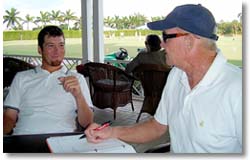
|
| Ben Rothman is interviewed by Bob Alman on the veranda of the National Croquet Center, November, 2008. |
BOB: Okay, so youíve made a very good case, I admit it. Letís change the subject. Letís be clear about it: When, exactly, did you decide that you could be the world champion of this sport? And you donít have to be shy about this one, because anyone playing at your level, we can assume, has thoughts about the world championship. Itís inevitable.
BEN: That is true. Probably in England.
BOB: You were thirteenth in the British Open last July. Is that what you mean?
BEN: No, before that, when I first traveled to England, to play in the Solomon Trophy matches. I had seen a few of the English play, at the World Championship in Sonoma or when a few players would come over for the North American Open, but I had never seen the best players all together, and before the Solomon I had been in the Midlands and seen Maugham play, and Jonathan Kirby, Ian Lines, Ian Burridge..... In the 2007 Solomon, I felt myself playing against them and feeling that I was playing on even ground.
BOB: And you proved it, I guess. Didnít you have something like a 50/50 record?
BEN: I did beat Ian Lines in two games and got one game off David Maugham, but I lost the match against Maugham.
BOB: What was your record in the Solomon?
BEN: If youíre counting games, it was three of seven in singles and five of eight in doubles. In matches, I won one and lost two in singles, and won two and lost one in doubles, with my partner Paul Bennett. When I saw myself playing on even ground Ė it really felt like even ground Ė thatís when I first thought I could be the world champion.
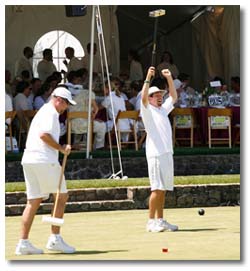
|
| Ben exults over a crowd-pleasing good shot that was also lucky in the 2008 North American Open Golf Croquet Showcase pro-am: "I had just scored hoop four from corner three, because the opponent got awesome position so I had to shoot at the double target of the wicket and his ball, and the ball went through from 90 feet." Adrian Wadley photo. |
BOB: So that was this year, 2008. And the reason weíre having this interview is that this is CLEARLY your breakthrough year, and your own realization that you could become the world champion is part of your personal breakthrough. And let me check this with you: When you go to a tournament Ė any tournament Ė you really expect to do very, very well, at the top of the field. You expect to be in the finals, or very close to it, donít you?
BEN: Yes.
BOB: The British Open would be your worst result of the year, but considering the competition, it really wasnít a bad result...
BEN: No. I got knocked out of the match elimination by two consecutive triples from Mark Avery, who is #35 in the world, and I got knocked out of the Consolation event by Peter Trimmer with a sextuple! So I canít be angry with myself, being peeled out like that. If they had been scrappy games, it would be different, but missing two long hit-ins doesnít make it a bad game.
BOB: Okay, well said, next subject: Youíre young, youíre raw, you make mistakes sometimes. I think Iíve SEEN you make mistakes, but Iím such a dummy at Association Croquet, I canít say that definitively. But let me ask you about the finals of the process ladder at the International Polo Club purse tournament last week. In which at two-back, with only two balls in the game, you shot for what must have been a 25-foot hoop Ė which, I would say, is odds-off for anybody in the world, and your opponent was miles away and probably wouldnít shoot at you if youíd just taken position, because a miss would cause him to lose pace, and.... See? Was that a mistake? Where did that come from? Was it suddenly demanded by your secret muse, making you do something that violated any reasonable risk-versus-gain calculation in that situation?
BEN: I like to think it was a calculated risk.
BOB: But was it WELL calculated?
BEN: Hindsight is 20/20, but...
BOB: Thank you for that!
BEN: Okay, maybe it was poorly calculated, but I felt like I had at least a 40 or 50 percent chance of ending up at least IN the hoop, if not through it. And Tony LeMoignan was at three-back, and set up, so if I could have scored the hoop and hit in, it would have meant...
BOB: So you defend the decision.
BEN: I do defend the decision, but not the shot....
| ROTHMANíS RECORD IN 2008 |
|
Palm Beach Invitational Tournament Champion, tied for 3rd in Doubles;
|
BEN: (hesitating) Well, it might help me to look at my notes...
BOB: So you do keep track of them...
BEN: Yes, I tend to write them down, I donít write down the successes, only the mistakes.
BOB: Okay, so you learn from mistakes.
BEN: Yes, the mistakes I learned from in that tournament were that I missed more shots in the 10- to 14-yard range than I should have. I did well enough in the short roquets and in the long ones, but in the mid-range...
BOB: The mid-range shots have always driven me crazy, and I think that applies to a lot of players, because on the one hand, you have a good reason for missing a long shot, but you think you really OUGHT to hit the mid-range shot if youíre any good, so when you think about missing it and how that would look, the psychological factor comes in, I think. Thatís the danger zone. Isnít that when your MIND attacks you....?
BEN: Yes, expectations play a major part in it. For me, itís the 30-foot shot. Your brain is telling you that you really should hit it, but you know you could miss. You just have to focus on fundamentals in a situation like that, to think about what youíre doing, and to execute the shot. And many times, if you know yourself, if you know your own mind, youíll choose a shorter shot over a slightly longer shot that would really work better for the game, assuming youíre going to hit it. So there are things you can do to sort of manage that mental circuitry....
BOB: Okay, that makes sense. So tell me, what mistakes did you observe and learn from in that tournament? Maybe something incremental, that you have to work on and practice more? Something tactical?
BEN: Well, I think I learned from some mistakes on the Rover peel. And another thing is that it makes a difference WHEN you win your game. I beat the eventual winners of both the Draw and the Process, but in the final game against each of them, I lost!
BOB: You were third. Big disgrace!
BEN: I was third in a money tournament that only paid for first and second!
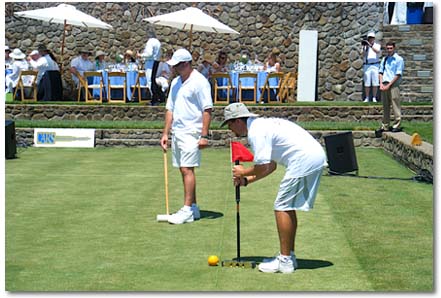
|
| Ben with his partner in the pro-am of the North American Open Golf Croquet Showcase Game 2008 at Sonoma-Cutrer. Adrian Wadley photo. |
BOB: So youíve got some work to do on the way to becoming the world champion. What is that work? Is it just a matter of noticing the flaws, the errors, correcting them in practice, and learning how to manage your mind in pressure situations?
BEN: Itís partly a matter of consistency, and I still have many things to learn in terms of precision tactics and strategy. When it comes to a Triple, or even straight Rover peels, or when to take calculated risks and when not to...
BOB: Thatís good. So there are things you can do, and you pretty much know what they are, and you know you can do them.
BEN: And experience will, hopefully, quell that mental anguish during a big match.
BOB: So on the mental side of it, maybe you could find a Zen master somewhere, to achieve good balance and focus and walking a straight line to achieving your intentions, and....all that stuff.
BEN: I have no plans to find a Buddhist monk....
BOB: There are plenty of them in Berkeley, where you come from....
BEN: I already have my Zen master.
BOB: Who is that?
BEN: Larry. Larry Stettner.
BOB: I wanted to ask you about that. He IS a wise old coot, isnít he?
BEN: Very. Taught me everything I needed to know to succeed in this game.
BOB: Not everything you need to know...
BEN: No, but everything I need to succeed in this game, all the fundamentals, and he taught me well. It may not be the easiest thing, teaching an impatient 13- or 14-year-old how to play this game.
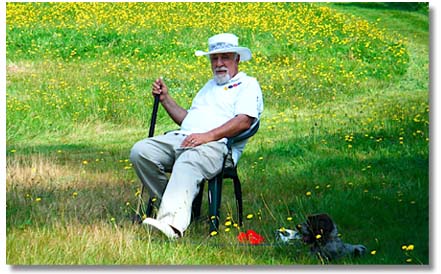
|
| Ben comments of his mentor, uncle Larry Stettner, "This is quintessential Larry, hanging out watching games at the 2008 Lobster Roll-Off in Ellsworth, Maine." |
BOB: Why would he do that? Did he want to ruin your life, or what? Why wouldnít he want you to focus your energies on Wall Street, or Baseball, or something with a big pay-off somewhere?
BEN: I think itís just because heís extremely passionate about the game, and about teaching it. He was a college professor for 30-something years, you know.
BOB: In what field?
BEN: Psychology.
BOB: Aha! So heís already your Zen master. Were there any other family members he tried to work this magic on?
BEN: Yes, but they donít compete at a high level. Heís taught his children to play, grandchildren, cousins...
BOB: But you are the prince of croquet.
BEN: So far, Iím the most successful player in the family.
BOB: Now, if croquet doesnít turn out to be a depression-proof business Ė because I know you are aiming at working and living as a full-time croquet pro Ė how are you planning to survive the coming dark years?
BEN: There will always be restaurants and people going out to restaurants, and they will always have waiters, and I know how to do that. And I also know quite a bit about construction, so Iíve built a kind of handy-man reputation...
BOB: What was your college career?
BEN: I have a bachelorís degree in psychology, but most of my college career was spent throwing Frisbee and partying...
BOB: So you werenít a serious student? Where did you matriculate?
BEN: University of California in San Diego - which competes with Berkeley and UCLA....
BOB: I want to talk more about impulse and inspiration in the middle of a game. I had thought, actually, that your 25-foot hoop shot might be that. Odds off, but you feel you should do it anyway, in the moment. Iíve felt that, Iíve done that, Iíve seen some pretty amazing things come out of that...
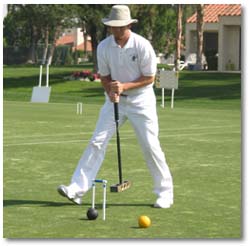
|
| Ben playing in the 2008 Mission Hills Invitational. |
BOB: But you will go with the flow sometimes, when the percentages donít necessarily agree...? Even though youíre not a Taoist....
BEN: But I think I AM a Taoist, following the way...
BOB: Youíre kidding. You call yourself a Taoist?
BEN: I AM a Taoist.
BOB: Okay, so part of being a Taoist is playing the percentages, I suppose. So letís be clear about what youíre doing with your life. Is it ALL about croquet now, at the age of 24?
BEN: I would like it to be. When I need to, I find other work to support myself, but Iíd like it to be all about croquet. Croquet is what Iíd like to do, and Iíve been told on good authority that while Iím 24, with very few responsibilities, this is the time to try to make it work.
BOB: You seem to be making it work pretty well, so far.
BEN: Well, this year was more about becoming known in the croquet world than about profit.
BOB: Arenít you a personable young man?
BEN: Iíd like to think so.
BOB: I see no reason why you shouldnít be a successful croquet pro. Do you? That would mean being paid to teach people to play. Being paid to lead corporate events, being paid to conduct clinics, and so on. To manage tournaments. All of that. Whatever pros do. Like being the tournament director, with Doug Grimsley, for the International Polo Club event.
BEN: The biggest niche in being a croquet pro is in teaching. And any croquet pro knows that promoting the game is a high priority. And not just because thereís money in promoting croquet, but because when croquet becomes more popular, there will be more work for pros. With more competitors, with more people playing, it will be a more enjoyable sport for everyone.
BOB: Enlightened self-interest. Youíre not an Objectivist, are you?
BEN: Iím not exactly sure what an Objectivist is.
BOB: Well, itís not likely that a self-proclaimed Taoist like you would also be an Objectivist Ė it seems contradictory. So what other labels WOULD you apply to yourself?
(long pause)
Maybe you donít apply any. Because the labels are confining, self-limiting...
BEN: And self-fulfilling, sometimes.
BOB: So you donít have to answer. As your spiritual adviser, Iíd advise you not to answer, not even to think about it!
BEN: There are labels others apply to me, but very few that I think really SHOULD be applied.
BOB: Really? What are they?
BEN: ďUp-and-comerĒ is one.
BOB: Really?
BEN: Yes, a croquet reporter said that recently.
BOB: Okay, you got me, I called you that. Journalists like labels. Makes it easy for us. My god, I think most of my questions are answered! How about this one: Are you any good at a REAL sport?
BEN: Iíve played competitive tennis in high school pretty well. Iíve played competitive Frisbee in college. I was really good at Frisbee.
BOB: Okay, well, assuming you can label Frisbee ďa real sport.Ē I guess it might be, in Berkeley, in San Diego, or UCLA. I can talk to you about Frisbee. Of course, I didnít compete, but I loved my Frisbee, I was there when it was first invented, in the dawning of the Age of Aquarius, before you were born, at the same time when everyone remotely hip was taking really GREAT drugs, to open the doors of perception. One of those doors, for me, happened to be with the Frisbee, on a Big Sur beach, on the mushroom, psylocybin, throwing the Frisbee far out over the waves, in a variable wind, and having it boomerang right back to my hand, every time. Amazing. Iíll never forget it, the wonder of it, the miracle of it....
BEN: Iíve done that many times. Without drugs.
(both laughing)
No, really! Many times when I didnít have a Frisbee game or somebody to throw with, with equal skill, I will go to the beach and watch it rise, and try to judge where itís going and catch it.
BOB: I actually thought there was some spiritual message there, something to be learned...
BEN: Playing catch with the god of the wind....
BOB: No, Iím making a serious point Ė maybe slightly controversial for croquet Ė but I learned that I knew things that I couldnít possibly know, or didnít know that I knew. And it would be nice to use that kind of knowledge, that level of knowing, in more consequential ways than throwing a Frisbee. Wouldnít it?
BEN: The all-knowing subconscious. Iím SURE my subconscious knows things that I donít know I know. Itís me, but a ďmeĒ I canít readily access.
BOB: You have no method, like taking psylocybin...
BEN: Well, my method would be simply TRUSTING in the subconscious, on the croquet court, all the time. Like when you have to hit in on a long shot, trusting your muscle memory...
BOB: Or even on the rare occasion when you will override your risk-versus-gain calculation?
BEN: That would be allowing that I know things that I donít know, yes. And trusting that I know things that I donít know.
BOB: Nobody would advise you to get into croquet as a career. But thatís what youíre aiming for.
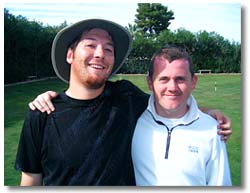
|
| Ben (left) celebrates his semifinals victory over Jacques Fournier, croquet wunderkind of the 90's, on the Kraft court in the 2008 Arizona Open. |
BOB: Thatís amazing! How could that happen?
BEN: Last fall my mother talked me into seeing a career counselor friend of hers, so I did a personality profile of skills and interests, and then a two-hour session with her. And I paid her by doing some handy-work Ė and she determined by examining my skill set and by talking to me that I should follow my passion. She said there are ways to find a living, a career within your passion, but finding the PASSION is the difficult part, she said, and I had already found it. She said that croquet was my overarching interest and that I should pursue it.
BOB: Did that make a difference to you?
BEN: It made a difference to my parents.
BOB: It must have upset your mother big-time! This was a friend of hers?
(both laughing)
Your mother must have felt terribly betrayed!
BEN: My parents were pretty good about rolling with it. They couldnít have been that surprised. They knew already it was a passion, with me. Iím the youngest of the siblings, Iím the one who travels the country and the world playing in croquet tournaments and doing whatever I have to do to make it work...
BOB: I hope you make it work. Why not? I think thereís a huge untapped potential in corporate croquet, which we havenít mentioned. There are no corporate members here at this wonderful facility, the National Croquet Center, and there are corporate groups coming out here constantly doing croquet lawn parties. But it doesnít produce members of the club, and it doesnít produce a Corporate membership, where the company extends club privileges to its employees or clients at the Center...
BEN: I think from the pros Iíve talked to about it Ė Jerry Stark and Ron Lloyd and even Peter Just, who used to do corporate groups at PGA Ė that corporate groups ought to be in the forefront of any croquet business, of any club.
BOB: And yet very rarely do croquet players come out of these corporate groups anywhere, not just here. I know this, because we did a lot of them in San Francisco. But maybe thatís not a fair comment, because you have to be REALLY committed to the game to play croquet a lot at Stern Grove, not the most elegant or comfortable environment, with all the wind... But that wouldnít apply here, at the National Croquet Center, for example. This is a perfect environment, it seems to me, for birthing a vital corporate croquet program... Whatís going on with that, do you think?
BEN: Part of it is that theyíre playing for the first time, itís Golf Croquet, thereís usually an open bar, they usually have a drink or two, itís casual, itís fun...
BOB: But you could regard that as a seduction strategy....
BEN: But then they watch the members playing croquet, and itís very quiet, and solemn, and itís not at all the same as what they were doing in their raucous game, trash-talking, drinking, laughing... It doesnít translate. The crowd is hushed, if there is one. No loud talking, itís very serious. They donít see any members playing the game they played, thereís no intermediate stage for them to pass through.
BOB: Probably not social at all, if theyíre watching singles.
BEN: So what you need to do is bring them out to play in a corporate league, to sort of bridge the gap between the social play at the lawn party and something more serious and deliberate. A more serious kind of fun. I thought Peter Just has a great concept, of bridging the gap between the ďcorporate event,Ē where they come out and drink and play for fun, with friends and co-workers, and then come back for a more serious but still fun Corporate League, maybe ten sessions.
BOB: I canít disagree with any of that.
BEN: So I think corporate events are the future of the game, or a way to go, and what Iím interested in doing is finding the right way to approach these corporate groups and make the case, to get these events going, because Iíd love to start doing that.
BOB: Theoretically, a place like this Ė the National Croquet Center Ė is ideal for that purpose.
BEN: Or Pinehurst, or Meadowood, any place like that. And once they come repeatedly, theyíre more likely to sit down and want to learn. They retain the social part, but they begin to learn some real skills, they play better, they get more interested.
BOB: Back to Ben the player: Whatís your target for the next year? Youíve had a fantastic 2008 playing year. You plan to play in the Solomon and the Worldís, I assume. Any more new worlds to conquer?
BEN: I have goals as a player, and I have goals as the croquet pro I want to become. My goal as a player, yes, is to be selected for my first Worldís in May here at the Center, [Editorís note: Rothman has qualified as the highest-ranked American in the event] and for the Solomon and the Carter next summer. Iíve found the Solomon to be an incredibly enjoyable event, a great team experience. Itís wonderful to be playing where you have spectators who are concerned enough about the outcome that you can talk strategy with them, and know that youíre doing it for a mutual benefit. While I usually enjoy talking strategy on the sidelines, youíre never really sure how interested people are, whether theyíre just indulging you.
As an individual player, a national championship would be the goal for next year. I would love to earn the respect that comes with being a national champion in singles or double. Or in Golf Croquet. Or even in 9-wicket croquet, because thatís the game I started with.
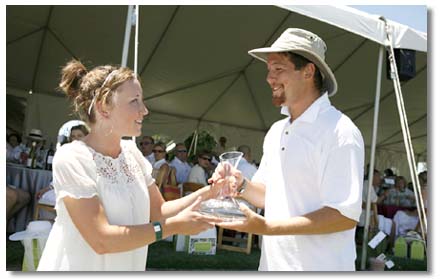
|
| In addition to a hefty cash purse, the Make-a-Wish sponsor presented Ben with a wine decanter trophy at the 2008 North American Open. Adrian Wadley photo. |
BOB: I noticed you werenít in Kansas City...
BEN: Well, the idea of two-inch-long tall grass turned me off....
BOB: Frankly, I donít understand that, either. I remember when Mike Orgill and I organized the Guerilla Croquet Club of San Francisco, in the late seventies, before we ever heard of USCA croquet, all of us loved to find and play on the shortest grass available. Iím pretty sure the vast majority of nine-wicket players would have more fun playing on a fast surface if itís available, and it usually IS available, and it doesnít have to be a special-built surface. In the sunbelt states, you can almost always find relatively fast bermuda grass surfaces, even in public parks, and even out of the Sunbelt, you can find them. In San Francisco, we loved to play on clay in the middle of Golden Gate Park, because it was fast and fun. So okay, youíd like to grab the top honors in all the forms of the game, including 9-wicket, if they have it on a fun surface. Now what about your goals as a pro-to-be?
BEN: Iíve conducted a few clinics this year, and Iíd like to expand on that by conducting other clinics around the country, to organize my schedule so that when I go to play or give a clinic, I at least break even financially over the course of the year, combining directing tournaments, giving clinics, even constructing individual player profiles and doing individual coaching, selling books. This year, I made more than I thought I would, but I didnít break even.
BOB: So, who supported you?
BEN: I did, by working other jobs, in between. I didnít break even with croquet income only, but I did when I included other jobs, like waiting tables. Iíd rather have it be all croquet, rather than croquet plus waiting tables, and handyman...
BOB: Well, you want a well-rounded life. What else do you do?
BEN: I like cooking. I like eating. I like exercise...
BOB: I heard there was a girlfriend somewhere Ė which could be a dangerous business, with your gad-about lifestyle...
BEN: It IS dangerous. There actually have been a few girlfriends.
BOB: Is the croquet a turn-off?
BEN: It can be, tournament after tournament, if you donít play.
BOB: But on the other hand, youíre almost at the level now where you can brag about being a sports hero, canít you?
BEN: A national championship would help. I had a great fill-in wait job this summer, and the boss was kind enough and flexible enough to let me go away for periods to play in major events, and it was nice to leave for one of those trips ranked #70 in the world and return and tell him, ďIím now #50 in the world rankings.Ē
BOB: Itís more impressive to say youíre #3 in America, I think. But youíve made the point. Youíre a very good croquet player, and Iíve heard youíre a good croquet teacher, too. Are you a good waiter?
BEN: I am.
BOB: Okay, Ben, to close, let me ask you: Is there anything you wouldnít do, or anywhere you wouldnít go to advance your croquet career?
BEN: Thereís very little I wouldnít do to promote croquet and the business of croquet. I would travel anywhere, I would teach any skill level for any number of hours, and I would promote the game relentlessly.
BOB: Well, if anyone deserves the big prize in croquet Ė including a seat at the very small table of financially self-sufficient croquet pros Ė I think you do. Iíve watched you play, and I predict youíll win more than one national championship, and soon. I wouldnít be surprised to see you as a finalist in the world championship within a very few years. Good luck to you.